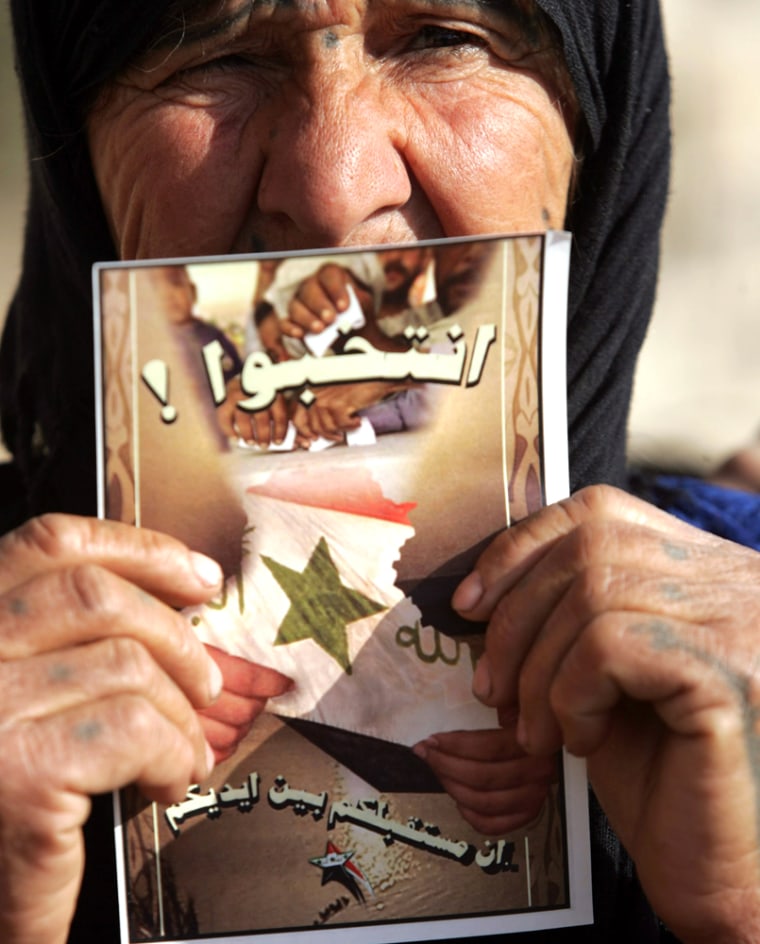What does the Jan. 30 election mean to Iraqis? You will get very different answers from very different Iraqis.
Most Sunnis — the Arab minority but with a strong presence in Baghdad — say they are indifferent. Ask a Sunni if he or she is going to vote and they will usually reply, ''what for?”
Mohammad, an educated Sunni who works for an American company in Baghdad, spoke on the condition of anonymity to explain his thoughts on the election.
''I'm not voting. The country is still at war. There is still an occupation. Most Sunnis won't vote because they are either too afraid or opposed to the vote. The election is really irrelevant. Iraq needs peace, not an election.''
None of Mohammad's family, friends or colleagues — all Sunnis — are planning to vote either.
A second chance for some
At the other end of the scale, ask a Shiite or Kurdish Iraqi about the meaning of this election, and you will likely get a mix of optimism and defiance.
Despite a wave of violent attacks against Shiite and Kurdish religious and political targets -- a car bombing Friday killed at least 14 at a mosque in the city -- these Iraqis see the election as a chance at a resurrection.
After decades of oppression under Saddam Hussein, and centuries of suffering at the hands of Sunni rulers, a vote in nine days time represents, for them, an act of empowerment nothing short of social revolution. A turning point for Iraq.
Few of these Iraqis worry the dearth of Sunni voters will skew the process or delegitimize the upcoming vote. Few of these Iraqis seem too worried about being killed by an insurgent bomb at a polling station or their families receiving death threats by anonymous phone call or letter.
Like Ali Abzarra, an arts student at the University of Baghdad, they tend to see the cup as half full.
''Sure, there's a threat to those who participate, but we don't care because we are building our future,'' said Ali, a Shiite who believes his co-religionists, about 60 percent of the population, are destined to rule. ''If 60 percent of the population votes,'' he explained, ''that will be good; it will make the election legal. If 30 or 40 percent don’t vote, we don't care about that.''
But others do care. Some Iraqi officials — and many pundits — predict that, if millions of Sunnis don’t vote — either through fear or choice — the result will fuel ethnic tensions, and could trigger a civil war.
''The Sunnis were the favored ethnic group inside Iraq,'' said Sajjan Gohel, analyst at Asia-Pacific Foundation in London.'' Now they feel like they won’t get their share of the political pie, that the Shiites will dominate politically, that they will control the economy; it doesn’t bode well for a united Iraq.''
Numbers game
Officially, the Iraqi government (with Washington's prodding) has tried to skirt the numbers game, most recently suggesting that, if around 50 percent of Iraqis vote, that will be just as legitimate as a vote in Western countries. The Bush administration — desperate to see something positive come from the election — emphasizes the process over the numbers.
But, back on campus, a group of students at Baghdad University wondered aloud what purpose the election serves if a whole people can't, or won't, vote.
''The Sunni people are part of the Iraqi people,” said a young female student in a green headscarf who refused to give her name. ''If they don't participate in the election, how can it be considered legal?''
To avoid answering that difficult question, the interim Iraqi government is scrambling to reach out to Sunni parties that have called for a boycott.
The U.S. military has engaged a new "front line," with house-to-house missions in hotbed towns like Ramadi and Mosul canvassing Iraqis about the election. The troops are asking, through interpreters, if they understand what the election means and how important their vote is.
Even Shiite political leaders, like Abdel-Aziz al-Hakim, the turbaned cleric who heads the top Shiite coalition and most likely to emerge as Iraq's new powerbroker, have publicly pledged support for Sunnis. Even if Sunnis do poorly at the polls, these Shiites have promised they will be fairly represented in the future government and in a commission that will draft Iraq's constitution.
Future still looks grim
However, despite the diplomatic offensive and calls for unity, Iraq's future remains grim.
Insurgents have shown on a daily basis that they can strike at will, with impunity, and intend to increase the number and boldness of their attacks before, during and after the election.
''The insurgents are hoping to raise the tensions between the Shiites and the Sunnism, to create tension and hatred between two ethnic communities that could be devastating for the future of Iraq,'' Gohel said.
So far, Shiite leaders have called for restraint, despite a number of targeted assassinations of Shiite officials and suicide car bombs outside Shiite mosques that have killed dozens. But if those Shiite leaders lose hope in the democratic process and call for revenge, says Gohel, only the insurgents would win.
''If they [the Shiites] are provoked more, if atrocities increase, then this could lead to total instability and certainly a bloodbath could occur,'' Gohel said.
The vote is meant to be a historic stepping stone towards a free and democratic Iraq — an unprecedented achievement in the Arab world.
But, at best, it seems, it will further divide Iraq along the strict ethnic lines between Sunnis, Shiites and Kurds that have existed since the arbitrary creation of its borders in 1921.
At worst, the vote will be so partial and skewed, experts say, that it will self-implode. As Mohammad, the Iraqi employee, and many Sunnis feel, the election is meaningless.
''If the insurgents are attacking the polling stations, you can't fight bombs and bullets with ballots.''
